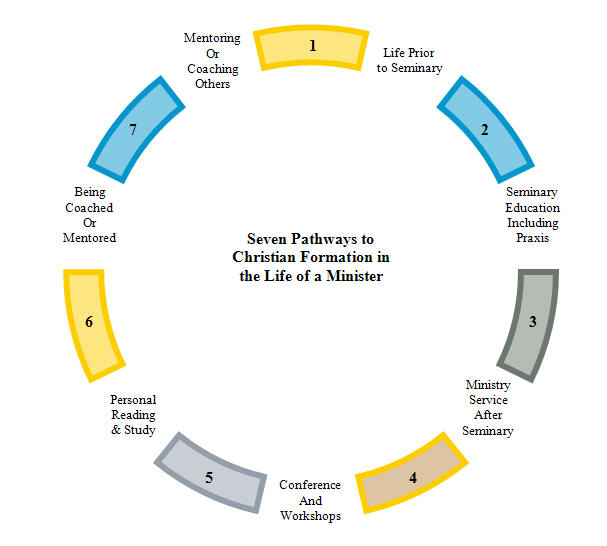I was thinking some time ago about the factors and influences that shape the Christian formation of ministers. This reflection led me to several observations born out of my curiosity. My initial observation is that many ministers do not prioritize continuing education as an integral part of ministry. Consider the following pathways to Christian formation in the life of a minister…

I could give several examples that lead me to believe that many ministers are not prioritizing continuing education as an integral part of their ministries, but one example is demonstrated by the lack of responses on this blog site. I am aware that many ministers are lurking on this site, yet most are not responding. Based on a recent, unscientific survey, the leading reason for a lack of participation was “I don’t have the time.†I don’t buy that. We do what we want to do. It may be that we “don’t make the time†because continuing education is not a priority in our ministry or we do not understand the value of the discipline of writing as a signifcant part of our Christian formation.
Continuing education is that piece of ministry that we often hold aside until we have or make time for it. My observation is that it is not a discipline that is practiced regularly for many ministers. The obvious conclusion, when we choose not to make continuing education a priority, is the belief that we no longer have a need for further Christian formation and that it is not as important as other ministerial functions. Is this true? Does a seminary degree and a few years of ministry exempt a minister from the need for further learning and education? I believe the discipline of continuing education is a lifelong need.
This thinking led me down a brainstorming path (a mind-mappers delight!) in an attempt to define what continuing education means for ministers who proudly display seminary diplomas on their office walls. What are those factors or influences that continue to shape us into Christlikeness? An obvious factor came quickly to mind. One way we are formed towards Chrislikeness is through our ministry service. That’s a no-brainer and we have no option regarding it. Step away from that responsibility and you might be flipping hamburgers at Hardees. Of course, I would then argue that the only thing you changed is your place of ministry and function!
But what about additional influences that shape us? A simple step towards a practice of continuing education is to attend workshops and conferences. It’s a simple matter to schedule a few during the year. And even better—participating in a monthly peer-learning-group. Of course, not all peer-learning-groups are the same, are they? Some are glorified social times rather than serious learning experiences. A harder next step is personal reading and study as a regular discipline. Yes, more difficult, because the more often you discipline yourself to do something, more opportunities compete for that time. It simply requires more commitment, and therefore, more time. How many books do you read each year? And then there is a deeper level when one makes him/herself vulnerable to others though intentional coaching or mentoring. We ministers don’t like to admit that we need that, do we? And yet, these times of continuing education can be the most productive times of our lives because we expose our weaknesses and open ourselves to learning. I’m experiencing my time spent twice each year at Lost River for family systems workshops a meaningful example of this pathway to learning. Finally, I might add that one of the most enjoyable times of continuing education for me is when I commit myself to mentoring or coaching others. Don’t believe for a minute that this is not a learning time for the coach or mentor!
OK, my pathways to Christian formation for the minister is nearly complete except that I did not mention the influences of life prior to seminary that shape us—family life, congregational life, friends, experiences, etc. All of these pathways are necessary periods of lifelong learning. Now, don’t steal my outline…I may write a book on this one day…or not! Ha!
Where are you on this pathway cycle? How serious are you about your continuing education? What is holding you back from responding on this blog site? The discipline of writing out one’s thoughts is a discipline in thinking. Want to know what you believe and why? Want to know what you do and why? Want to know what you should stop doing and why? Want to develop the knack for seeing things differently? What to bring clarity to your ministry? Want to slip out of the rut of boredom into creative possibilities? Want to heal yourself? Write, my friend. Share yourself. Tell your stories. Ask questions. Find some new pathways and follow them with curiosity and relentless discipline.
Questions for reflection and response:
-
What discipline or practice have you found most helpful for your intellectual growth?
What practice has provided you meaningful spiritual growth?
What practice have you found most helpful for your emotional growth?
What place(s) have you found most helpful for your professional development?
What resources contribute to your continuing Christian formation?


3 Responses to Christian Formation in the Life of a Minister